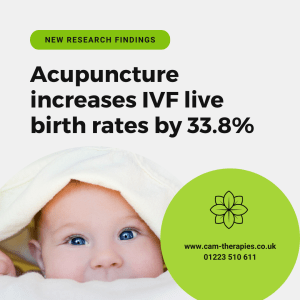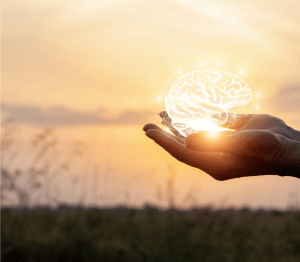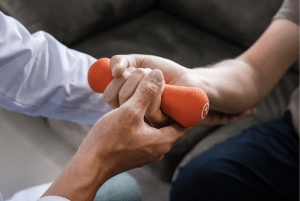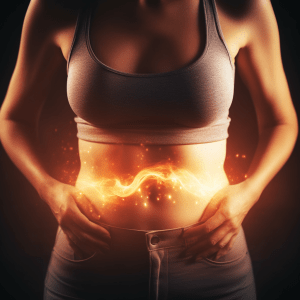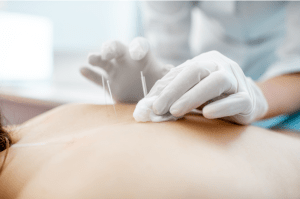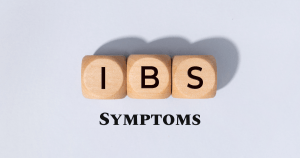Table of Contents
In a hurry? Read a summary answer.
Acupuncture stimulates the release of endorphins and neurotransmitters, including serotonin and dopamine; it balances the autonomic nervous system, influences hormonal release, and induces neuroplastic changes in the brain. These effects make acupuncture a valuable complementary therapy for various health conditions, including chronic pain, headaches and migraines, anxiety, depression, digestive issues, hormonal imbalances, fertility and cognitive decline.
Introduction: Unravelling the Mystery of Acupuncture
Acupuncture is an ancient healing practice that has fascinated people worldwide for over 2,500 years. Its mechanisms were once shrouded in mystique, involving the concepts of Qi and meridians.
However, with the publication of over 20,000 research studies, the acceptance of acupuncture has grown exponentially. Nearly 4,000 international guidelines recommend acupuncture for the treatment of a wide range of health conditions.1
In this article, we will delve into the science behind acupuncture’s efficacy in treating various health conditions.
Traditional Chinese Medicine vs Medical Acupuncture
While the age-old concept of Qi (vital energy) flowing through the body’s meridians is foundational to acupuncture’s Traditional Chinese Medicine (TCM) history, this article will primarily focus on the western medicine biomedical model that offers a scientifically-grounded understanding of how acupuncture works. We will delve into the cutting-edge research that has transformed acupuncture from a mystical practice to one of the most evidence-based therapies.
Unlike traditional concepts of Qi, the biomedical model of acupuncture focuses on the physiological and neurological processes that occur during acupuncture treatment.
By exploring the scientific basis of acupuncture, we can gain a better understanding of why it is so effective in treating so many different health conditions.
Understanding the Biomedical Model of Acupuncture
The biomedical view of acupuncture emphasises the role of the nervous system, hormones, and other physiological processes in the body’s response to acupuncture. It proposes that stimulating acupuncture points can trigger various reactions in the body, including releasing natural pain-relieving chemicals, modulating the immune system, and regulating the autonomic nervous system.
This contemporary approach allows us to study acupuncture through the lens of neurophysiology, exploring how the body’s nervous system and other physiological systems respond to the insertion of very thin needles at specific acupuncture points.
By focusing on these tangible and measurable processes, the biomedical model has transformed acupuncture from a practice steeped in ancient beliefs to a scientifically-grounded complementary therapy.
Acupuncture Points and Meridians in the Biomedical Model
In the biomedical model, acupuncture points and meridians have a new significance. While the traditional concept of energy flow through meridians is not the primary focus, the anatomical locations of these acupuncture points still play a crucial role in the therapy’s effectiveness.
What exactly are acupuncture points?
Acupuncture points can be explained as areas where sensory and autonomic nerve fibres form a network that responds to acupuncture stimulation.
- Autonomic nerve fibres are part of the nervous system that controls involuntary bodily functions.
- Sensory nerve fibres transmit sensations such as pain, temperature, and touch.
Acupuncture points are rich in nerve fibres, and when stimulated, they can produce various physiological responses. In a study of rats, it was found that acupuncture points have high conductance and low impedance, which are electrical properties that make these acupuncture points distinct from other areas of the skin.2
What are acupuncture meridians?
Acupuncture meridians can be understood as pathways along which nerve fibres run. The term “meridian” can be equated with the trajectory of nerves in the body. Studies have found that acupuncture points and their corresponding meridians are closely related to the peripheral and cranial nerves, as well as their branches. These relationships between acupuncture points, meridians, and nerves are not coincidental.
The nervous system plays a crucial role in the therapeutic effects of acupuncture. Stimulating acupuncture points can lead to various physiological responses, for example, pain reduction or anti-emetic effects. These responses are linked to the stimulation of specific nerve fibres in the acupuncture points, which in turn send signals to the brain. Acupuncture can also influence the autonomic nervous system, affecting the function of internal organs.
In summary, acupuncture points and meridians can be understood scientifically as locations where nerve fibres are densely concentrated, and their stimulation can produce various physiological responses. These points and pathways are closely related to the anatomy and physiology of the nervous system, and their unique electrical properties contribute to the therapeutic effects of acupuncture.
The Science Behind Acupuncture: Biological Mechanisms
Acupuncture Effect on Endorphins and Neurotransmitters
Exploring the intricate connections between acupuncture and the nervous system is key to unravelling the scientific underpinnings of this ancient healing practice.
The nervous system functions as one of the body’s messaging systems, conveying signals throughout its various parts. For instance, when tissue is injured, the nervous system transmits signals to the brain, eliciting specific reactions. In response to these signals, the body may release endorphins or other chemicals to diminish the pain sensation and ultimately promote healing.
Research shows that acupuncture interacts with these communication channels to produce a wide array of health benefits. When acupuncture needles are inserted into specific acupuncture points, they stimulate the nerves in the targeted region and can trigger the release of various hormones and chemicals, such as neurotransmitters.
Neurotransmitters are chemical messengers responsible for transmitting signals between nerve cells within the body, helping to regulate numerous bodily functions. These naturally occurring chemicals are pivotal in managing pain relief, mood, and stress response, making them indispensable elements in acupuncture’s healing process. In the following sections, we delve deeper into the specific neurotransmitters influenced by acupuncture.
Acupuncture and Endorphins
Endorphins, often referred to as the body’s natural painkillers, are released during acupuncture treatments.3 They bind to brain receptors and help relieve pain. The release of endorphins can also create a sense of well-being and relaxation, contributing to acupuncture’s stress-reducing effects.
Acupuncture and Serotonin and dopamine
In addition to endorphins, acupuncture has been shown to influence the release of other neurotransmitters, such as serotonin and dopamine.4 These chemicals are known for their roles in regulating mood, sleep, and appetite. By modulating these neurotransmitters’ levels, acupuncture can positively affect mental health and overall well-being.
Acupuncture and Norepinephrine
Acupuncture has also been associated with releasing norepinephrine, another essential neurotransmitter that plays a role in the body’s stress response.5 By stimulating the release of norepinephrine, acupuncture can help to regulate the stress response and promote relaxation, making it a valuable tool for managing stress and anxiety.
Acupuncture and Gamma-Aminobutyric Acid (GABA)
GABA is an inhibitory neurotransmitter that helps to calm the nervous system and promote relaxation.4 Acupuncture has been shown to increase the levels of GABA in the brain, which can contribute to its calming and stress-reducing effects. This increase in GABA may also play a role in acupuncture’s ability to improve sleep quality and help with insomnia.
Acupuncture and Acetylcholine
Another neurotransmitter acupuncture influences is acetylcholine, which plays a vital role in memory, learning and muscle contraction.4 By affecting acetylcholine levels, acupuncture can potentially impact cognitive functions and support the nervous system’s communication with muscles, contributing to the body’s overall well-being.
Acupuncture and Glutamate
Glutamate is an excitatory neurotransmitter that plays a crucial role in learning, memory, and brain function.4 Acupuncture may help regulate glutamate levels in the brain, contributing to improved cognitive function and potentially assisting with conditions such as chronic pain and depression, where glutamate imbalances may be a contributing factor.
Acupuncture and Oxytocin
Oxytocin, often called the “love hormone,” is a neurotransmitter involved in social bonding, trust, and stress reduction. Acupuncture has been shown to influence oxytocin release, which may help improve emotional well-being and reduce stress levels. This effect can particularly benefit individuals affected by anxiety, depression, or other mental health challenges.
In conclusion, acupuncture’s therapeutic effects can be attributed to its influence on various neurotransmitters, including endorphins, serotonin, dopamine, norepinephrine, GABA, acetylcholine, glutamate, and oxytocin. These neurotransmitters play crucial roles in regulating pain, mood, stress response, sleep, cognitive function, and emotional well-being, making acupuncture a versatile and valuable complementary therapy for a wide range of health concerns.
Acupuncture Effect On The Autonomic Nervous System
The Autonomic Nervous System (ANS) is another crucial part of the body’s physiology when exploring the science behind acupuncture. The ANS is responsible for regulating involuntary functions in the body, for example, heart rate, blood pressure, and digestion. It consists of two main branches:
- The sympathetic nervous system, which prepares the body for action in stressful situations, and
- The parasympathetic nervous system, which promotes relaxation and recovery.
Acupuncture has been found to influence the activity of the autonomic nervous system (ANS), helping to balance the sympathetic and parasympathetic branches. When inserted at specific points, acupuncture needles stimulate the nerves that activate or inhibit certain ANS functions. This modulation can lead to various health benefits, such as reduced stress, improved digestion, and enhanced immune function.
For example, studies have shown that acupuncture can help to lower blood pressure6 and reduce heart rate in individuals with hypertension by promoting the activity of the parasympathetic nervous system. Similarly, acupuncture has been found to improve digestion and alleviate symptoms of conditions like Irritable Bowel Syndrome (IBS) by regulating the ANS’s influence on the gastrointestinal system.
Acupuncture Treatment Effect On The Endocrine System
The endocrine system is a complex network of glands and organs that produce and release hormones, which help regulate various bodily functions such as growth, metabolism, and stress response. Acupuncture has been found to influence the release of hormones and modulate hormonal balance.
Several studies have shown that acupuncture can affect the levels of hormones such as insulin, thyroid hormones, and reproductive hormones. For example, a research study found that acupuncture reduces levels of a stress hormone called cortisol.7
Acupuncture has been used to treat conditions related to hormonal imbalances, such as Polycystic Ovary Syndrome (PCOS),8 menopausal symptoms,9 and thyroid disorders.
The mechanisms by which acupuncture affects the endocrine system are still being investigated. Evidence suggests that stimulation of specific acupuncture points can influence hormonal release and regulation by modulating the activity of the Hypothalamus-Pituitary-Adrenal (HPA) axis,10 a vital component of the endocrine system.
Acupuncture Neuroplastic Effects on the Brain
The concept of neuroplasticity revolves around the brain’s ability to adapt and reorganise itself in response to various stimuli, experiences, and changes. In simpler terms, it means that the brain can change and adapt throughout an individual’s life, forming new connections between neurons (brain cells) and even creating new neurons.
Neuroplasticity can be both beneficial and detrimental, depending on the circumstances. Good neuroplasticity, or positive neuroplastic changes, can be observed in various situations:
- Learning and memory: When we learn new skills or acquire new knowledge, our brain forms new connections and strengthens existing ones to store this information. This positive neuroplasticity helps us retain memories and improve our cognitive abilities.
- Recovery from brain injury: In cases of brain injury or stroke, neuroplasticity can help the brain reorganise and compensate for damaged areas by forming new connections or reassigning functions to healthy areas. This adaptive capability is crucial for regaining lost functions and promoting recovery.
- Emotional well-being: Positive neuroplastic changes can support emotional regulation and resilience, helping individuals cope with stress and adapt to challenging situations. Engaging in mindfulness practices, such as meditation or yoga, can promote positive neuroplastic changes that enhance emotional well-being.
Conversely, bad neuroplasticity, or negative neuroplastic changes, can have detrimental effects on an individual’s well-being:
- Neuroplastic pain: In some cases, the brain’s ability to adapt can lead to the persistence of pain, even after the initial injury or cause has healed. This negative neuroplasticity can result in the development of chronic pain conditions as the brain becomes more sensitive to pain signals.
- Addictions: Negative neuroplastic changes can contribute to the development and maintenance of an addiction. Repeated exposure to addictive substances or behaviours can alter the brain’s reward system, making it more challenging to break free from the addictive cycle.
- Stress and anxiety: Prolonged exposure to stress can lead to negative neuroplastic changes in brain regions responsible for regulating emotions and stress responses. These changes can exacerbate anxiety and make it more difficult for individuals to manage stress effectively.
- Cognitive decline: Negative neuroplasticity can also contribute to cognitive decline and memory loss associated with ageing or neurodegenerative conditions such as Alzheimer’s disease. In these cases, the brain may lose connections between neurons, leading to a decline in cognitive functions.
Given neuroplasticity’s significant role in shaping our brain function and overall well-being, it is crucial to identify and utilise therapies that induce positive neuroplastic changes.
One such therapy is acupuncture because it targets specific brain regions and pathways. Research shows that acupuncture can induce neuroplastic changes in the brain, promoting the formation of new neural connections and strengthening and modifying existing ones. This ability to influence brain connectivity and functionality can lead to various health benefits, such as improved cognitive function, enhanced learning and memory, and better emotional regulation. Some of the ways how acupuncture contributes to neuroplastic changes are as follows:
- Cerebral blood flow: In one study, stimulation of certain acupuncture points increased blood flow in the prefrontal cortex in patients with mild cognitive impairment.11 This enhanced blood flow can help to deliver oxygen and nutrients to brain cells, supporting their function and promoting the formation of new neural connections and improvements in cognitive function. On the other hand, stimulation of a different acupuncture point, LI4, which is often used to treat pain, has been shown to reduce blood flow in the prefrontal cortex and motor cortex brain regions.12 Reduced cerebral blood flow in the prefrontal cortex in patients suffering from pain can help to relieve their symptoms.
- Brain-derived neurotrophic factor (BDNF): BDNF is a protein that plays a crucial role in neurons’ survival, growth, and differentiation. Acupuncture has been shown to increase BDNF levels in the brain,13,14 which can support neuroplasticity and improve cognitive function and mental health.
- Neurotransmitters: As previously discussed, acupuncture can modulate the release and function of various neurotransmitters, such as glutamate, serotonin, and dopamine. These neurotransmitters are essential for communication between neurons and play crucial roles in learning, memory, and emotional regulation. By affecting neurotransmitter systems, acupuncture can contribute to neuroplastic changes that support cognitive and emotional well-being.
- Structural changes in the brain: Research has also revealed that acupuncture can induce structural changes in the brain. For example, in one study, acupuncture increased the grey matter area in the brains of stroke patients, thus potentially facilitating motor function and cognition recovery.15
By modulating neurotransmitter systems, regulating cerebral blood flow, and promoting the release of neuroprotective factors, acupuncture can facilitate beneficial neuroplastic adaptations that improve brain health and function, making it an essential therapeutic tool in promoting optimal neuroplasticity.
Health Benefits of Acupuncture: Evidence-Based Findings
As more high-quality scientific research on acupuncture is published, we are beginning to uncover the wide range of health benefits this time-honoured practice can offer. By understanding how acupuncture interacts with the body’s systems, we can truly appreciate its potential as a complementary therapy for various health problems.
How Does Acupuncture Work To Relieve Pain?
One of acupuncture’s most well-documented health benefits is its ability to help relieve pain and manage various pain-related conditions. The effectiveness of acupuncture in dealing with pain can be explained by the previously discussed mechanisms, such as brain neuroplasticity and the release of endorphins.
- Chronic pain conditions: Acupuncture effectively treats various chronic pain issues, including low back pain, neck pain, and osteoarthritis. Many studies have shown that acupuncture can provide significant relief for these conditions, often resulting in lasting effects and improved quality of life for patients. The evidence supporting acupuncture as an effective treatment for chronic pain is so robust that, in their 2021 guidelines on chronic pain management, The National Institute for Clinical Excellence (NICE) recommend acupuncture as one of only four evidence-based therapies for managing chronic primary pain.16 Additionally, NICE recommend acupuncture for the prevention of tension headaches and migraines.17
- Acute pain situations: Acupuncture is also proven to manage acute pain situations,18 such as pain after surgery, menstrual cramps and dental pain. By reducing the intensity of pain and the need for medication, acupuncture can promote faster recovery and decreased reliance on painkillers.
The evidence supporting acupuncture’s role in pain relief and management showcases its potential as a non-invasive, low-risk treatment option for individuals seeking alternative or complementary therapies for various painful conditions.
How Acupuncture Works for Anxiety and Depression
Acupuncture’s impact goes beyond physical pain relief, as it has also demonstrated its potential to improve mental health and well-being. By regulating the levels of neurotransmitters like serotonin and dopamine, acupuncture can have positive effects on mood and stress reduction.
- Anxiety and stress reduction: Acupuncture has been shown to help reduce anxiety and stress levels in various studies.19 Acupuncture induces relaxation and balances the activity of the autonomic nervous system, which helps to alleviate stress and anxiety.
- Depression treatment: Research also indicates that acupuncture can effectively reduce depression symptoms.20 By modulating the levels of neurotransmitters involved in mood regulation and reducing neuroinflammation, acupuncture may help ease depressive symptoms and improve emotional well-being. When used alongside traditional treatments like therapy and medication, acupuncture can serve as an additional tool in the comprehensive treatment of depression.
By addressing mental health and well-being, acupuncture demonstrates its versatility as a complementary therapy, providing relief and support for individuals coping with various psychological challenges.
How Does Acupuncture Work For Fertility And Reproductive Health?
By modulating the activity of the autonomic nervous system and regulating hormonal balance, acupuncture practitioners can support individuals facing fertility challenges or seeking to improve their reproductive health.
- Female fertility: Research has indicated that acupuncture can benefit women experiencing fertility issues. By helping to regulate hormonal balance,21 improving blood flow to the reproductive organs,22 and reducing stress, acupuncture can potentially enhance the chances of conception. Many studies have also found that acupuncture can improve the success rates of In Vitro Fertilization (IVF) treatment.23
- Male fertility: Acupuncture has also been studied in the context of male fertility, with some findings suggesting that it can improve sperm quality and motility.24 While more research is needed to fully understand the extent of acupuncture’s impact on male fertility, the existing evidence highlights its potential for men facing fertility challenges.
The benefits of acupuncture in fertility and reproductive health further demonstrate its wide-ranging potential as a complementary therapy, offering hope and support for individuals and couples on their journey toward parenthood.
Other Health Benefits: Acupuncture's Diverse Applications
Acupuncture’s potential for promoting health and well-being extends to various other areas, demonstrating its versatility as a complementary therapy. From sleep disorders to tension headaches to digestive issues, acupuncture can relieve and support various conditions.
- Insomnia and sleep disorders: Acupuncture benefits individuals with insomnia and other sleep disorders.25 By regulating neurotransmitters that play a role in sleep and relaxation, acupuncture can help improve sleep quality and promote restorative rest. As a non-pharmacological option, acupuncture offers a natural alternative for those seeking to improve their sleep without relying on medication.
- Digestive issues, such as Irritable Bowel Syndrome (IBS): Acupuncture can also help address digestive problems, including IBS.26 By influencing the autonomic nervous system’s activity, acupuncture may help regulate digestive functions and alleviate symptoms such as abdominal pain, bloating, and constipation. As a complementary therapy, acupuncture can support those coping with chronic digestive issues.
- Allergies and respiratory conditions, like hay fever: Acupuncture has shown potential in treating allergies and respiratory diseases such as hay fever.27 By modulating the immune system and reducing inflammation, acupuncture can help to alleviate symptoms and improve respiratory function. As a complementary treatment, acupuncture can provide additional relief and support for those managing allergies and respiratory issues, improving their quality of life.
The diverse health and other benefits associated with acupuncture highlight its wide-ranging potential as a complementary and alternative medicine, offering relief and help for individuals with various health challenges.
How Acupuncture Works: A Summary
In this article, we have delved into the fascinating science of acupuncture, exploring its scientific underpinnings and explaining the array of health benefits it can offer.
With a strong foundation of scientific evidence and a wide range of health benefits, acupuncture stands out as a valuable complementary therapy for numerous health issues. From pain relief and mental health support to improving fertility and addressing sleep disorders, acupuncture offers a versatile, low-risk treatment option for individuals seeking alternatives or complementary therapies for their health challenges.
If you haven’t yet experienced acupuncture, we encourage you to find a registered acupuncture practitioner near you and explore the potential benefits of acupuncture for your health.
References And Further Reading
- Birch, S. Update on publications by medical expert groups (Clinical Practice Guidelines, Treatment Guidelines) that make recommendations about acupuncture. (2022).
- Fan, Y. et al. Neuropeptides SP and CGRP Underlie the Electrical Properties of Acupoints. Front. Neurosci. 12, 907 (2018).
- Han, J.-S. Acupuncture and endorphins. Neurosci. Lett. 361, 258–261 (2004).
- Chen, T., Zhang, W. W., Chu, Y.-X. & Wang, Y.-Q. Acupuncture for Pain Management: Molecular Mechanisms of Action. Am. J. Chin. Med. 48, 793–811 (2020).
- Trento, M. M. S., Moré, A. O. O., Duarte, E. C. W. & Martins, D. F. Peripheral receptors and neuromediators involved in the antihyperalgesic effects of acupuncture: a state-of-the-art review. Pflüg. Arch. – Eur. J. Physiol. 473, 573–593 (2021).
- Zhang, M., Zhu, Y., Wang, J., Li, Y. & Hua, Z. Association between acupuncture and grade 1 hypertension: A systematic review and meta-analysis. Complement. Ther. Clin. Pract. 49, 101649 (2022) doi:10.1016/j.ctcp.2022.101649.
- Amorim, D. et al. Electroacupuncture and acupuncture in the treatment of anxiety – A double blinded randomized parallel clinical trial. Complement. Ther. Clin. Pract. 46, 101541 (2022).
- Qu, F. et al. The effects of acupuncture on polycystic ovary syndrome: A systematic review and meta-analysis. Eur. J. Integr. Med. 8, 12–18 (2016).
- Befus, D. et al. Management of Menopause Symptoms with Acupuncture: An Umbrella Systematic Review and Meta-Analysis. J. Altern. Complement. Med. 24, 314–323 (2018).
- Zhang, X.-N. et al. Electroacupuncture and moxibustion-like stimulation activate the cutaneous and systemic hypothalamic–pituitary–adrenal axes in the rat. Acupunct. Med. 40, 232–240 (2022).
- Khan, M. A., Ghafoor, U., Yoo, H.-R. & Hong, K.-S. Acupuncture enhances brain function in patients with mild cognitive impairment: evidence from a functional-near infrared spectroscopy study. Neural Regen. Res. 17, 1850 (2022).
- Si, X. et al. Acupuncture With deqi Modulates the Hemodynamic Response and Functional Connectivity of the Prefrontal-Motor Cortical Network. Front. Neurosci. 15, 693623 (2021).
- Seo, S. Y. & Ryu, Y. Electroacupuncture stimulation of HT7 alleviates sleep disruption following acute caffeine exposure by regulating BDNF-mediated endoplasmic reticulum stress in the rat medial septum. Biomed. Pharmacother. 155, 113724 (2022).
- Liou, K. T. et al. Effects of acupuncture versus cognitive behavioral therapy on brain-derived neurotrophic factor in cancer survivors with insomnia: an exploratory analysis. Acupunct. Med. 39, 637–645 (2021).
- Wu, P. et al. Structural Changes Induced by Acupuncture in the Recovering Brain after Ischemic Stroke. Evid. Based Complement. Alternat. Med. 2018, e5179689 (2018).
- NICE. Chronic pain (primary and secondary) in over 16s: assessment of all chronic pain and management of chronic primary pain. (2021).
- Recommendations | Headaches in over 12s: diagnosis and management | Guidance | NICE. https://www.nice.org.uk/guidance/cg150/chapter/Recommendations (2012).
- Xiang, A., Cheng, K., Shen, X., Xu, P. & Liu, S. The Immediate Analgesic Effect of Acupuncture for Pain: A Systematic Review and Meta-Analysis. Evid. Based Complement. Alternat. Med. 2017, 1–13 (2017) doi: 10.1155/2017/3837194.
- Amorim, D. et al. Acupuncture and electroacupuncture for anxiety disorders: A systematic review of the clinical research. Complement. Ther. Clin. Pract. 31, 31–37 (2018).
- Xu, G. et al. Clinical Evidence for Association of Acupuncture with Improved Major Depressive Disorder: A Systematic Review and Meta-Analysis of Randomized Control Trials. Neuropsychobiology 1–13 (2022) doi:10.1159/000527903.
- Wang, Y. et al. Electroacupuncture for Reproductive Hormone Levels in Patients with Diminished Ovarian Reserve: A Prospective Observational Study. Acupunct. Med. 34, 386–391 (2016).
- Xu, Z. & Gao, Y. Effects of acupuncture on ovarian blood supply and pregnancy outcomes in patients receiving assisted reproduction. J. Acupunct. Tuina Sci. 16, 253–259 (2018).
- Zhang, X. et al. Effects of acupuncture during in vitro fertilization or intracytoplasmic sperm injection: An updated systematic review and meta-analysis. Eur. J. Integr. Med. 23, 14–25 (2018) doi:10.1016/j.eujim.2018.09.001.
- Yu, Y. et al. Effects and mechanism of action of transcutaneous electrical acupuncture point stimulation in patients with abnormal semen parameters. Acupunct. Med. 37, 25–32 (2019).
- Zhao, F.-Y. et al. Can acupuncture improve objective sleep indices in patients with primary insomnia? A systematic review and meta-analysis. Sleep Med. 80, 244–259 (2021) doi:10.1016/j.sleep.2021.01.053.
- Shi, Y. et al. Acupuncture vs. antispasmodics in the treatment of irritable bowel syndrome: An adjusted indirect treatment comparison meta-analysis. Front. Physiol. 13, 1001978 (2022).
- He, M., Qin, W., Qin, Z. & Zhao, C. Acupuncture for allergic rhinitis: a systematic review and meta-analysis. Eur. J. Med. Res. 27, 58 (2022).


